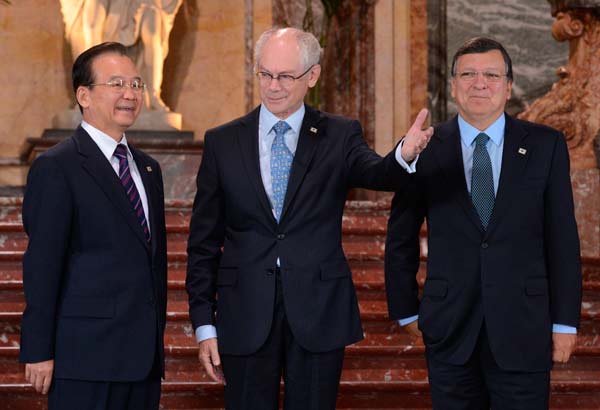
 |
|
Premier Wen Jiabao is welcomed by Herman Van Rompuy, (center), president of the European Council and European Commission President Jose Manuel Barroso to the China-EU summit in Brussels on Thursday. JOHN THYS / Agence France-Presse |
Brussels summit sees premier, bloc leaders agree on investment talks
China and the European Union significantly boosted their commercial ties on Thursday by agreeing to start talks on an investment treaty as Premier Wen Jiabao attended his final summit in Brussels.
Wen held discussions with the President of the European Council Herman Van Rompuy and Jose Manuel Barroso, European Commission president.
The leaders decided to launch the treaty talks, ensuring favorable legal and policy investment environments for enterprises, "as soon as possible", the Foreign Ministry said.
In an address to Chinese and European business leaders, Wen said that he expects both parties to be each other's major trading partner by 2015.
The EU is China's top trading partner, while China is the bloc's second-largest trading partner and the largest source of imports.
Trade reached $567.2 billion in 2011 and Europe also saw an annual increase of Chinese investment last year of 94.5 percent, to $4.46 billion.
However, business ties are also suffering from the European debt crisis, with China's exports to Europe falling 12.7 percent in August from a year earlier, for the third month in a row.
"China is a responsible long-term investor ... it will continue to help to solve the European debt crisis through proper channels," the premier said in his address.
China has already supported Europe greatly via the International Monetary Fund investing in some sovereign funds and in the European Stability Mechanism.
Wen's suggestion of conducting investment treaty negotiations are timely as the old mechanism for Sino-EU economic cooperation is outdated, said Zhao Junjie, an expert on European studies at the Chinese Academy of Social Sciences.
Many guidelines for economic cooperation between China and the EU date back to the 1980s, Zhao said.
"A new investment agreement to guide future economic cooperation should be reached as soon as possible," he said.
The investment treaty is the foundation for a free-trade area between China and the EU, he added.
Feng Zhongping, an expert on European studies with the China Institutes of Contemporary International Relations, said that the EU expects more investment from China to help it combat the debts crisis, but there is not yet a good mechanism to regulate that investment.
Besides, there are still many problems in Sino-EU economic cooperation.
"To be fair, both sides need to make a new mechanism," Feng said.
Andre Loesekrug-Pietri, chairman and managing partner of A Capital, said the key for Europeans is to include market access in the investment treaty, especially concerning joint ventures. For China the key is to encourage more European firms to conduct research and development in China, he said.
The summit also focused on cooperation and Wen suggested "large-scale" combined efforts in various sectors, including transport, electricity and telecommunications.
He said the government will encourage enterprises and financial institutions to get involved in infrastructure projects in Europe to build a logistics network covering the whole Eurasia continent to meet the demand of booming trade ties.
Vice-Foreign Minister Song Tao said that the summit is a special one as it serves as a link between the past and the future.
The premier was treated to a "special banquet" on Thursday, attended by the heads of almost all major EU organizations.
The banquet, a far from common gesture by the EU, is an indication of the importance Brussels attaches to the relationship with Beijing, insiders said.
Top of the summit agenda was an anti-dumping investigation the European Commission initiated into China's solar panels on Sept. 6.
Minister of Commerce Chen Deming immediately held talks with EU Trade Commissioner Karel De Gucht as soon as the Chinese delegation arrived in Brussels on Wednesday evening.
Wen said that he expected the dispute can be handled in a proper way through talks. The case involves more than $20 billion of Chinese exports and constitutes a test of the EU's commitment to free trade.
Wen also met Belgian Prime Minister Elio Di Rupo later on Thursday. The trip is also an official visit to Belgium.
Contact the writer at [email protected]







